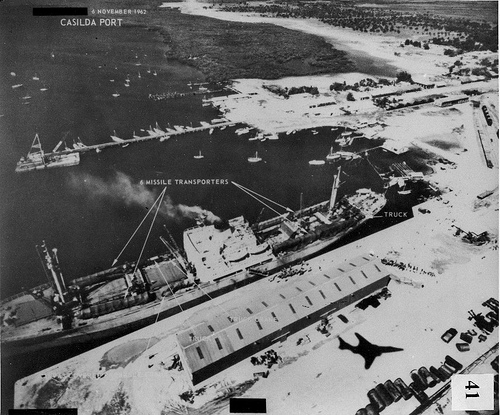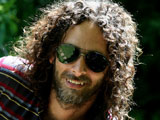On Cuba, Korea, Kim, Castro, and Other Smuggling Against World Peace
by Orlando Luis Pardo Lazo / August 5, 2013 / 1 Comment
In which a North Korean boat shipping Cuban sugar is caught with missiles, rockets, and two MiG jets.

An F-101 on a recon run over Cuba during the Cuban Missile Crisis, 1962. Photo: Kemon01 via Flickr.
Half a century after putting the world on the brink of nuclear holocaust (during the Cuban Missile Crisis of October 1962), the Castro brothers are still behaving like warlords in government, risking lives and deceiving the international community.

- Is it worth-while to focus on the last images and letters coming from the inside of the last living utopia on Earth? Is Cuba by now a contemporary country or just another old-fashioned delusion in the middle of Nowhere-America? A Cold-War Northtalgia maybe? Can we expect a young Rewwwolution.cu within that Ancien Régime still known as The Revolution? I would like to provoke more questions than answers.

- Orlando Luis Pardo Lazo was born in Havana City and still resides and resists there, working as a free-lance writer, photographer and blogger. He is the author of Boring Home (2009) and is the editor of the independent opinion and literary e-zine Voces.
This month, after the North Korean merchant vessel Chong Chon Gang was seized on suspicion of smuggling in the Panama Canal, the Cuban Ministry of Foreign Affairs itself admitted that the ship had set sail from the Island with 265 tons of undeclared arms: Two Volga and Pechora anti-aircraft missiles, nine deconstructed rockets, two MiG-21 fighter planes, and fifteen airplane engines. All of this was hidden beneath 11,000 tons of sugar.
Panama’s minister of foreign relations, Fernando Núñez Fábrega, told reporters from the Spanish news agency EFE that the Cuban government “had not correctly measured the risk at which they were putting an ally nation.” But the Cuban government always measures its risks correctly: They have not signed the Panama Canal Neutrality Treaty, nor have they bothered to respect UN resolutions, such as the one that prohibits the exchange of arms with North Korea’s genocidal dictatorship. Cuba is therefore simply playing the role it always has: A revolutionary regime that has exported guerrillas and wars for decades, without ever having to suffer any military response on its soil.
A few weeks earlier, Kim Kyok Sik, Chief of the Korean People’s Army, had visited Havana at the head of a military delegation, where he was received by General Raúl Castro. The pair surprised the world with the news that Cuba and North Korea share “the same trench” due to their “historic links.”
Only now do we understand this nonsense between these two countries, which are antipodean both geographically and in their idiosyncrasies: This was a declaration of war against global peace. Perhaps that’s why the Cuban press has published nothing about the situation in Panama. Neither has North Korea, despite the fact that the Chong Chon Gang‘s 35 crew members are still being held there (they mutinied before giving themselves up, and the captain even tried to cut his own throat). This silence hasn’t been affected to deceive our countries’ peoples, but rather to avoid alarming them before it’s time.
Dearest Raúl Castro and Kim Jong Un: Thanks for being so kind.





One Comment on "On Cuba, Korea, Kim, Castro, and Other Smuggling Against World Peace"
Trackbacks for this post